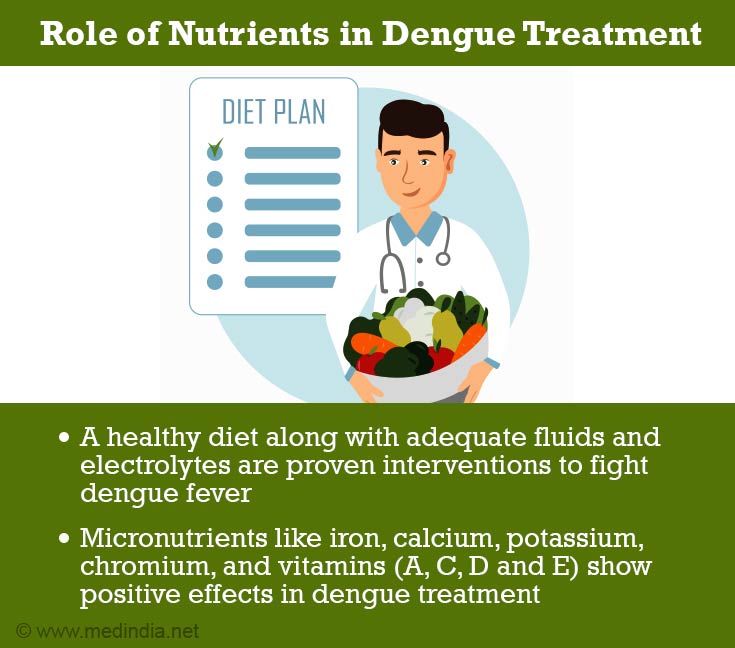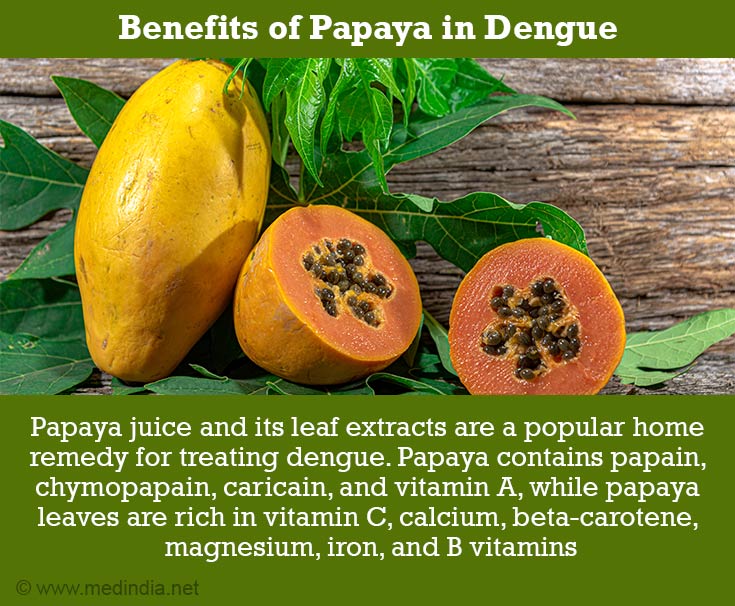- Dengue Fever - (https://www.ncbi.nlm.nih.gov/books/NBK430732/)
- Importance of proper nutrition in dengue infections - (https://www.jnmhs.com/article-details/17975)
- Dengue fever - (https://www.mayoclinic.org/diseases-conditions/dengue-fever/symptoms-causes/syc-20353078)
- Dengue infection: Global importance, immunopathology and management - (https://doi.org/10.7861/clinmed.2021-0791)
- Micronutrients and dengue - (https://www.ajtmh.org/view/journals/tpmd/91/5/article-p1049.xml)
- Effectiveness of a fluid chart in outpatient management of suspected dengue fever: A pilot study - (https://journals.plos.org/plosone/article? id=10.1371/journal.pone.0183544)
- Prevention and control of dengue by diet therapy - (https://www.dipterajournal.com/pdf/2017/vol4issue1/PartA/4-1-10-484.pdf)
- Dengue Fever: Therapeutic Potential of Carica papaya L. Leaves - (https://www.ncbi.nlm.nih.gov/pmc/articles/PMC8109180/)
- Fighting off dengue through food - (https://www.nnc.gov.ph/regional-offices/mindanao/region-x-northern-mindanao/5434-fighting-off-dengue-through-food)
About
Dengue fever is a viral infection transmitted to humans by the bite of infected Aedes mosquitoes and is a major cause of arthropod-borne viral disease globally. Dengue viral infections are commonly seen in tropical and subtropical regions and are endemic in some parts of the world. Aedes aegypti and Aedes albopictus are the primary vectors of the dengue virus (DENV).
Reports by the World Health Organization (WHO) revealed an eight-fold increase in the number of dengue cases over the past 20 years. In India, the highest number of cases are reported in Telangana, Karnataka, and Maharashtra, according to the National Center for Vector Borne Disease Control(1✔ ✔Trusted Source
Dengue Fever
Go to source, 2✔ ✔Trusted Source
Importance of proper nutrition in dengue infections
Go to source).
Impact of Dengue Fever on the Body
Infection caused by the virus causes a temperature rise of up to 104°F along with other symptoms such as severe muscle spasms, joint pain, headache, nausea, vomiting, swollen glands, rashes, and pain behind the eyes(3✔ ✔Trusted Source
Dengue fever
Go to source). While most patients are asymptomatic, it may worsen in some patients, resulting in severe dengue or dengue shock syndrome. Unusual or expanded dengue could affect multiple systems in the body, as mentioned below:
- Gastrointestinal - Pancreatitis, cholecystitis, hepatitis, hemorrhagic liver necrosis
- Neurological - encephalopathy, encephalitis, neuropathies
- Cardiac - myocarditis, pericarditis
- Musculoskeletal - myositis
- Hematological - immune thrombocytopenia
- Renal- nephritis(4✔ ✔Trusted Source
Dengue infection: Global importance, immunopathology and management
Go to source)
Dengue Diet Chart
Foods are natural sources of immune boosters. The dengue diet chart should be well-balanced, nutrient-rich, and immune boosting. The macronutrient composition should include 50% to 55% calories from carbohydrates, more than or equal to 1g of protein per kg of body weight, and 20% to 25% of fat. Fluids and electrolytes are more than essential when planning a diet chart for a dengue patient. Foods that increase and maintain platelet count, like fruits, vegetables, and dairy products like milk, curd, yogurt, buttermilk, and paneer, should be included in the diet(2✔ ✔Trusted Source
Importance of proper nutrition in dengue infections
Go to source).
Recommended Fluids for Dengue Patients
Dehydration may occur due to increased fluid loss from the body due to fever, vomiting, and diarrhea. Maintaining body fluid volume is pivotal and one of the primary goals of diet therapy for dengue. The WHO recommends consuming at least five glasses of fluids every day. The best fluids for dengue include fruit juices, coconut water, milk, barley water, rice water, soup, and oral rehydration solutions(6✔ ✔Trusted Source
Effectiveness of a fluid chart in outpatient management of suspected dengue fever: A pilot study
Go to source).
Lemon water can potentially restore electrolyte balance to the body. It is also a good source of vitamin C, an immune-boosting and detoxifying nutrient.

Mousambi juice provides polyphenols such as flavanones, naringenin, hesperetin, and chlorogenic acid, along with vitamins and minerals.
Coconut water is a rich source of potassium and provides hydration.
Soups made using spinach, tomato, beetroot, and mixed vegetables can be great fluid options.
In Ayurveda, freshly crushed papaya leaf extracts are recommended to be consumed twice daily(2✔ ✔Trusted Source
Importance of proper nutrition in dengue infections
Go to source, 7✔ ✔Trusted Source
Prevention and control of dengue by diet therapy
Go to source).
Adequate fluid intake may assist in reducing hospital readmission, requirement of intravenous fluid therapy, infection severity, and morbidity(6✔ ✔Trusted Source
Effectiveness of a fluid chart in outpatient management of suspected dengue fever: A pilot study
Go to source).
Role of Micronutrients
A healthy diet along with adequate fluids and electrolytes are proven interventions to fight dengue fever. Both macronutrients and micronutrients are vital in boosting immunity against infection and managing platelet count(6✔ ✔Trusted Source
Effectiveness of a fluid chart in outpatient management of suspected dengue fever: A pilot study
Go to source).
There are certain nutrients that are studied closely to understand their effect on infection management.
Vitamin D was found to stimulate innate and adaptive immunity by activating T cells and monocyte differentiation. The binding of this vitamin to its receptor activates pathogen-fighting mechanisms. Studies have demonstrated that a higher concentration of 1, 25-dihydroxy vitamin D3 ameliorates the reduction of infected cells and the production of proinflammatory cytokines.

Zinc deficiency has been shown to reduce resistance to viral infection. Zinc helps maintain normal macrophage and natural killer cell activities while influencing lymphocyte maturation, free radical production, and cytokine generation. An observational study revealed that low levels of zinc were associated with a rise in the severity of dengue virus infection.
Vitamin A is known to significantly reduce the risk of morbidity and mortality in infectious diseases. Though there is very little evidence on vitamin A and dengue fever, a study found an association between dengue and low levels of beta-carotene and retinol.
Chromium was shown to be instrumental in increasing the platelet count in animal models.
Vitamin E is a promising nutrient in the treatment of dengue fever. A clinical trial in India has demonstrated that oral supplementation of vitamin E (400 mg) helped boost platelet counts in dengue patients. Vitamin E also acts as an antioxidant, thereby reducing oxidative stress(5✔ ✔Trusted Source
Micronutrients and dengue
Go to source).
What Foods to Eat during Dengue?
Vegetables are abundant in vitamins, minerals, and powerful antioxidants and play important roles in dengue treatment.
Beetroot contains good amounts of vitamin B9, vitamin C, manganese, potassium, iron, folic acid, and water. It helps increase the RBC count and can be consumed as juice or soup. Spinach is a great choice for its iron, potassium, vitamin K, carotene, and lutein zeaxanthin content. Tomatoes can be consumed regularly as soups, salads, or in main dishes for their vitamin C and potassium content(7✔ ✔Trusted Source
Prevention and control of dengue by diet therapy
Go to source).

Fruits are abundant in vitamins, minerals, and antioxidants. Fruits like kiwi fruit, amla, guava, dragon fruit, apple, pomegranate, and orange can help increase platelet count, boost immunity, and provide hydration. Papaya juice and its leaf extracts are popular home remedies for treating dengue. Papaya contains papain, chymopapain, caricain, and vitamin A, while papaya leaves are rich in vitamin C, calcium, beta-carotene, magnesium, iron, and B vitamins(2✔ ✔Trusted Source
Importance of proper nutrition in dengue infections
Go to source, 8✔ ✔Trusted Source
Dengue Fever: Therapeutic Potential of Carica papaya L. Leaves
Go to source).
Foods that are easy to digest, like rice gruels, khichdi, boiled vegetables, porridge, soup, toast, curd, and paneer, can be included in the diet. Energy-dense foods like milk, potatoes, and rice help regain strength. Legumes, green leafy vegetables, eggs, and well-cooked meat help increase hemoglobin levels and platelet count by providing adequate iron(7✔ ✔Trusted Source
Prevention and control of dengue by diet therapy
Go to source, 9✔ ✔Trusted Source
Fighting off dengue through food
Go to source).
Dengue Foods to Avoid
Foods to avoid include deep-fried foods, caffeinated drinks like coffee and energy drinks, salty foods, and high-fat foods. Consuming foods with caffeine stimulates dehydration. Foods high in fat and spice may cause digestive discomfort, gastric acid build-up, irritation, and intestinal bleeding(9✔ ✔Trusted Source
Fighting off dengue through food
Go to source).
The Bottom Line
A well-designed diet plan in the treatment of dengue fever is a valuable tool in promoting recovery, improving nutritional status, managing symptoms, preserving fluid and electrolyte balance, increasing RBC and platelet counts, halting infection severity, and reducing hospital readmission.






